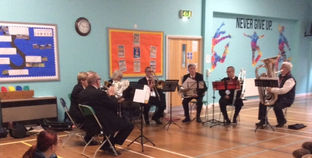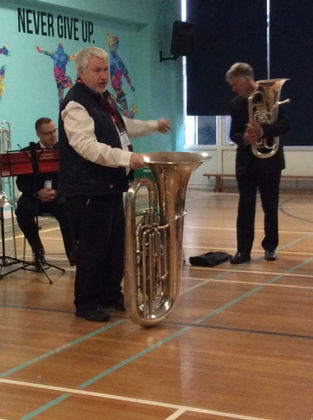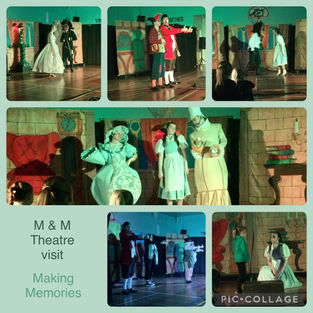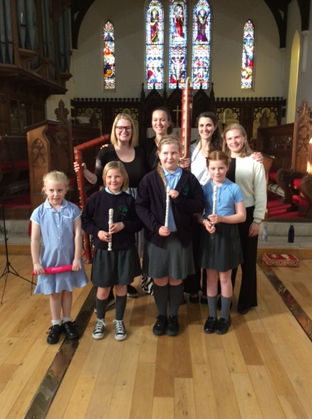





Music Intent
We study music to experience a varied range of practical activities and cultural experiences that cover a broad spectrum of musical styles and genres. At Hunnyhill, we aim to foster an enjoyment of music for our children so that they will gain valuable independent and ensemble experiences that teach self discipline, resilience and reflective skills and supports our school values.
We encourage children to participate in a variety of musical experiences through which we aim to build up the confidence of all children. Our teaching focuses on developing the children’s ability to understand rhythm and follow a beat. Through singing songs, children learn about the structure and organisation of music. We teach them to listen and to appreciate different forms of music.
Children develop descriptive language skills in music lessons when learning about how music can represent different feelings, emotions and narratives. We also teach technical vocabulary such as volume, pitch, beat and rhythm and encourage children to discuss music using these terms.

Music Implementation:
At Hunnyhill we deliver music using a well mapped music curriculum where skills have been clearly mapped across the year groups to ensure adequate progression. Music is taught using an exploration based approach through a range of topics.
We use a Topic based approach alongside Kapow scheme of work. Our music curriculum is designed so to cover the all-important music strands : understanding, listening, singing, playing, improvising and composing. Vocabulary are taught carefully and revisited. Our curriculum has been designed so children have the opportunity to return to the same skills and knowledge.
Each time these skills are revisited in greater depth. Children are encouraged to explore and making music through listening to a different genre, singing, exploring and using instruments. Areas of learning, such as times tables in maths, vocabulary in languages and movement in dance can all incorporate different elements of music. Performances, such as Christmas Carols, Nativities and end of year shows, demonstrate that music is important to the life of the school and give our children the opportunity to perform in front of an audience. Our extracurricular activities, also provide children with experience of making music.
We aim to develop a culture of inclusion for all where everyone feels proud of their identity and is able to participate fully in our music lessons. We study different genre of music and musicians from all background. We aim to give every child the opportunity to experiment and learn to play with an instrument.

%20(1).jpg)
MUSIC
Curriculum Progression
Music Vocabulary
Music topics at Hunnyhill
0ur Curriculum at Hunnyhill
Why this curriculum?
We want to equip our children with key knowledge and skills, as well as give them a range of opportunities that they may not get elsewhere.
This curriculum enables them to learn about great musicians, learn to listen and describe different genre of music, they may not have known before. It also gives them the opportunity to experiment with instruments, composition, annotations and performance. We want music to be enjoyed by the whole school community. Half termly pieces of music will be listened to and studied to enrich children’s cultural awareness of different genres and styles.
Music Impact:
The impact of teaching music will be seen across the school with an increase in the profile of music. Whole-school and parental engagement will be improved through performances, extracurricular activities and opportunities suggested in lessons/overviews for wider learning.
Participation in music develops wellbeing, promotes listening and develops concentration. The impact of our curriculum scheme can be monitored through both formative and summative assessment opportunities. Each lesson includes guidance to support teachers in assessing pupils against the learning objectives. We have created our own assessment sheets for each unit which include the learning outcomes for children with secure understanding, those working at greater depth and those who need support. This enables teachers to keep records of formative assessments for each child. Kapow also provides quizzes to asses the impact of our curriculum. We want to ensure that music is loved by teachers and pupils across school, encouraging them to want to continue building on this wealth of musical ability, now and in the future.










Extra curriculum activities and music opportunities at Hunnyhill:
As well as music lessons we provide children with music lunch clubs and after school clubs. Recorder, keyboard and choir are some of the clubs we provide. We also bring live performances into school to enhance our music profile and give opportunities to children to watch, listen and participate to live performances.
We work closely with our Music Hub and we provide opportunities for children to develop their music abilities outside school. These are posted on our school dojo. We also work with other schools and the music hub to organise musical events in the local community. Curtain Call and Music Hub provide singing and listening workshop for children and CPD opportunities for staff.
Palisander Concert 2024
Hunnyhill is so very proud of these children who played fantastically at a Palisander concert in June 2024.
Playing with professional musicians, what an achievement and fabulous memory for them. They have worked really hard, practising, rehearsing and they were so very brave to perform in front of an audience.
Huge well done to all involved from all of us at Hunnyhill Primary!

Extra Curricular opportunities














